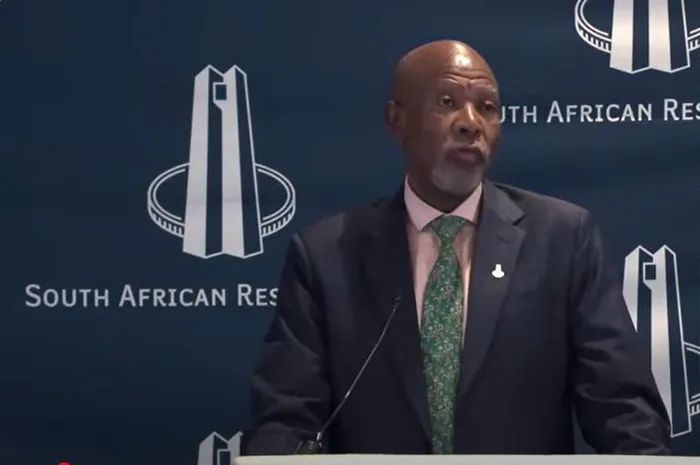
South African Reserve Bank Governor Lesetja Kganyago has called for tech-driven financial inclusion in Africa.
Image: YouTube screengrab
South African Reserve Bank (SARB) Governor Lesetja Kganyago has called on innovators to develop scalable, cross-border technology solutions that uphold trust and integrity in financial systems, saying such efforts are essential to tackling the global challenges regulators face.
Kganyago delivered his remarks virtually during the opening session of the G20 TechSprint 2025, hosted in Sandton.
In his address, Kganyago said, “Trust and integrity are the two pillars that form the backbone of any resilient financial system.”
“Consumers, businesses and investors must be confident that regulated institutions will keep their money safe and secure.”
He outlined three key areas where technology must deliver meaningful progress: digital identity, secure data exchange, and cyber risk mitigation.
“The first challenge is the development of verifiable, privacy-preserving digital identity solutions,” Kganyago said.
“The second is the creation of a secure credit data exchange that incorporates consumer consent. And the third is the advancement of technology solutions for fraud and cyber risk mitigation.”
The SARB and the Bank for International Settlements (BIS) launched the 2025 G20 TechSprint − a joint initiative between the G20 Presidency and the BIS Innovation Hub.
The TechSprint is a global innovation challenge calling for best-in-class technological solutions to address common challenges and key priorities of the global regulatory and central banking community.
The G20 TechSprint is an annual global innovation competition co-hosted by the Bank for International Settlements (BIS) Innovation Hub and the G20 Presidency.
Kganyago emphasised the importance of these innovations for Africa, where broader access to digital services could significantly boost financial inclusion and support cross-border trade under the African Continental Free Trade Area (AfCFTA).
Its mission is to identify and promote cutting-edge technological solutions that address key challenges faced by central banks and financial regulators worldwide.
“We are looking for solutions that will bring more people into the digital economy and enable cross-border trade,” he said.
“A secure and verified digital identity will allow consumers to open accounts, apply for loans or access government grants without time-consuming processes.”
He added that a consumer-consented data-sharing system would allow small and medium-sized enterprises (SMEs) to access financial services more easily, enabling offerings such as real-time credit scoring and automation of lending workflows.
“The exchange of credit data across borders in a safe and transparent environment is vital for unlocking financial access, particularly for SMEs that drive economic growth on the continent,” Kganyago said.
He also linked the summit’s objectives to South Africa’s broader efforts to modernise its financial infrastructure, as part of the global G20 roadmap to enhance cross-border payments.
“As the South African Reserve Bank embarks on an ambitious agenda to modernise our payment system, we hope this TechSprint will unlock fresh thinking and spark broader ideas,” he said.
“Innovation must drive innovation, build trust and deliver lasting impact, not just for Africa, but for the world.”
Kganyago said the Reserve Bank is committed to working with global partners such as the Bank for International Settlements (BIS) in building a more connected and sustainable financial future.
“We look forward to continuing our close collaboration with the BIS on finding solutions that will help shape a more inclusive and resilient global financial system,” he said.
Meanwhile, Bank for International Settlements general manager Agustín Carstens said this year’s G20 TechSprint, the sixth edition co-hosted with the G20 Presidency, focuses on an emerging challenge - trust and integrity in scalable and open finance.
“Each previous edition addressed a priority identified by the G20 Presidency.”
Carstens said, pointing to past themes such as sustainable finance, cross-border payments, and regulatory technology.
He outlined three major challenges targeted in 2025, which are the complexity of domestic and cross-border data sharing and know-your-customer (KYC) mechanisms, limited access to finance for small and medium enterprises, particularly in emerging markets, and growing concerns around fraud and cyber risks in fast payment systems.
“Addressing these challenges will make financial services more accessible, inclusive, and competitive,” Carstens said.
He called TechSprint “a unique opportunity to harness the collective intelligence and creativity of the technology community” to solve persistent problems in the global financial system.
Each of this year’s three project statements targets a different angle of financial trust.
The first seeks digital identity solutions that support privacy-preserving data exchange, regulatory compliance, and secure participant verification, ideally in ways that users can adopt unilaterally without compromising system integrity.
The second focuses on credit data portability.
“We are calling for innovative technology solutions that overcome barriers preventing small and medium-sized enterprises from accessing finance,” he said.
Consumer-consented, secure data sharing could reduce compliance costs and promote inclusion.
The third project statement addresses fraud and cybercrime in fast payment systems.
“Enhanced trust will be essential for widespread adoption, especially across emerging markets,” Carstens said.
“Balancing speed and efficiency with effective risk mitigation is essential, while trust and integrity are non-negotiable.”
Carstens emphasised that the G20 TechSprint is more than a competition.
“It is a collaborative effort to redefine the future of finance,” he said.
Related Topics:
